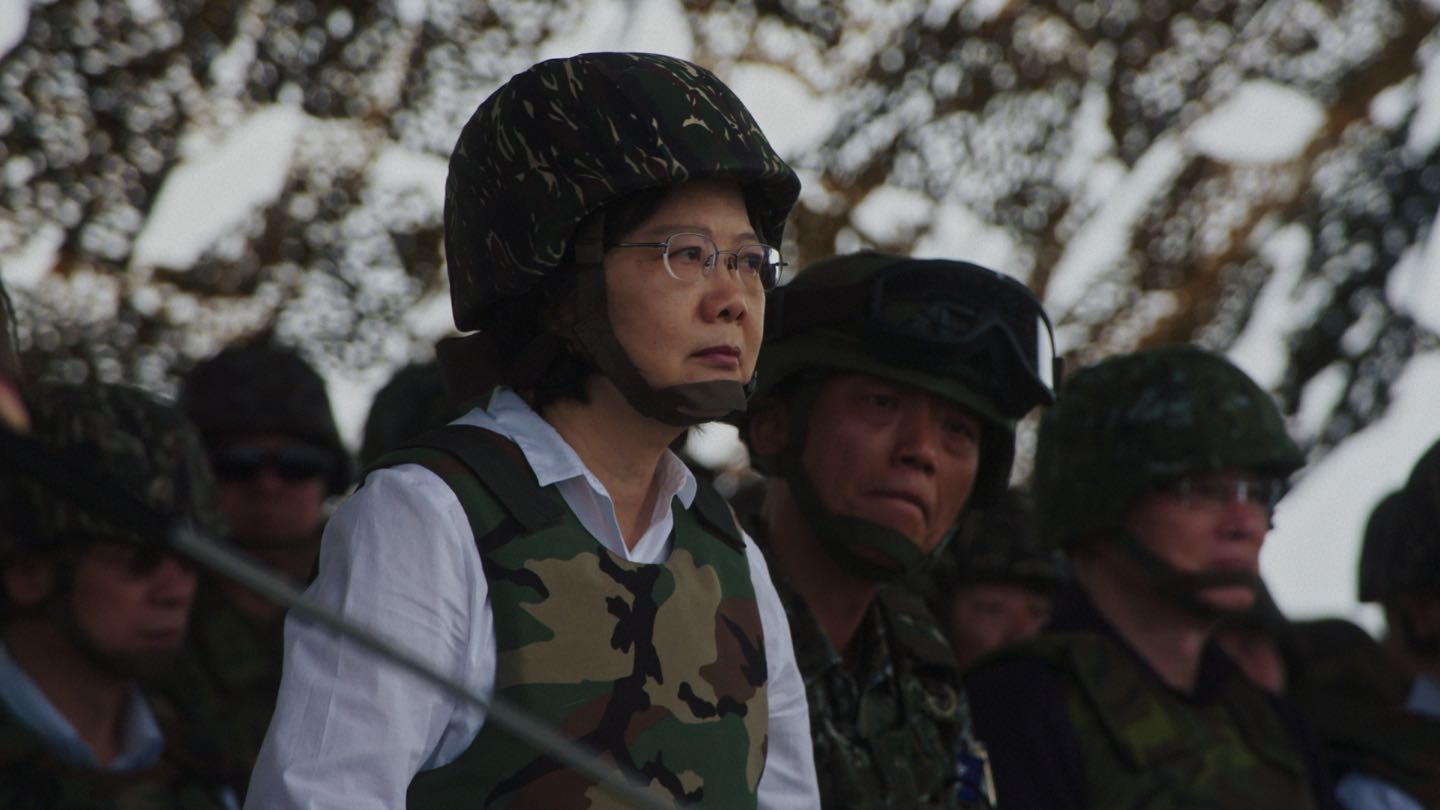
With warnings of “Ukraine today, Taiwan tomorrow” sounding around US foreign policy circles lately, it’s hard not to draw linkages between the documentaries 20 Days in Mariupol and Invisible Nation, which center on Ukraine and Taiwan respectively. Though the two films have not yet officially appeared as a double feature at any venue, both are touring the Western (i.e. mainly American) festival circuit this fall, and it seems worthwhile for some programmer to take note of their juxtaposition. While the pair have distinct cinematic styles, their degree of alignment in terms of broader political objectives and positioning within the US media landscape deserve more contemplation.

20 Days in Mariupol is directed by Mstyslav Chernov, a Ukrainian journalist for the Associated Press who, along with colleagues Vasilisa Stepanenko and Evgeniy Maloletka, were the last journalists to remain in the city of Mariupol before it fell to Russian forces after a months-long siege in spring 2022. The documentary compiles raw footage that Chernov shot in Mariupol, interspersing it with news clips that show how parts of that footage were broadcast in Western media while the siege occurred.
Chernov narrates the documentary in a somber whisper, injecting a participatory element and offering behind-the-scenes commentary to illuminate harrowing situations that his team faced as they tried to document Mariupol’s plight—constant Russian attacks, lack of cell phone reception, electricity cuts, and more. While those who’ve followed Russia’s invasion of Ukraine closely have likely seen Chernov’s work—for example coverage of infamous airstrikes on a drama theater and maternity hospital both full of civilians—20 Days in Mariupol stitches those events together into a more cohesive, Mariupol-specific storyline. The effect is chilling. Incidents that received mere seconds and soundbites in news reports play out in extended, uncensored takes jaggedly filmed under fire, making the destruction seem an order of magnitude worse than what short headlines could reveal. Chernov’s voiceover, and the documentary’s chilling soundscape, drive the devastation home. It’s an immersive, horrifying experience.

Invisible Nation, by contrast, has a largely expository rather than observational style. The film does not convey horror—China is not yet invading Taiwan, after all—but rather seeks to inform. It mainly consists of interviews with international commentators and independence-leaning luminaries from Taiwan’s political sphere, most notably President Tsai Ing-wen. While the documentary’s marketing materials bill it as a chronicle of Tsai’s rise to power over the past decade, that’s only partially true.
Scenes with Tsai only occupy a minority of Invisible Nation’s runtime, and the film spends significant effort using infographics and its interviewees to explain basic facts of Taiwanese history—Dutch colonization, Japanese colonization, martial law, that Taiwan was never actually ruled by the People’s Republic of China, and so forth. Thus, it’d be more accurate to describe Invisible Nation as a primer on the development of Taiwan’s present-day national identity, with Tsai’s 2016 election and 2020 re-election as narratively elegant checkpoints that demonstrate how Taiwan is asserting a distinct identity from China.
Those who’ve followed Taiwanese politics for the past decade or two will likely not learn much new from Invisible Nation. The documentary talked to everyone that you’d expect it to talk with for the narrative that it seeks to tell, and aptly synthesizes the main points that Anglophone journalists covering Taiwan (many of whom actually show up in the film, or assisted its production in some way) have already been writing about for years now. What Taiwan specialists may find most interesting about Invisible Nation, then, is the simple fact that the American cinematic-industrial complex might have finally decided there is at least a modicum of appetite beyond small wonky circles for such a Taiwan-focused documentary feature. Advocates for Taiwan ought to be pleased with Invisible Nation‘s degree of focus, nuance, and relevancy.

This is where—despite their stylistic differences—20 Days in Mariupol and Invisible Nation find immense common ground. Whether intentionally or not, both documentaries’ narrative choices help them more effectively target American audiences, or American liberal elite audiences to get even more specific.
20 Days in Mariupol can assume that many Americans have already read about the Mariupol theater bombing in The New York Times, and only needs to simply jog their memories with a news report before diving into raw footage, and re-strumming their heartstrings with narration and music; it’s an exercise of reactivating empathy rather than education. On the other hand, Invisible Nation must rely on interviews with Taiwanese politicians who speak fluent English (ex. not just Tsai Ing-wen, but also Foreign Minister Joseph Wu, de facto Ambassador to the US Hsiao Bi-khim, and former President Ma Ying-jeou for some obligatory political balance), noted diaspora (ex. writer Shawna Yang Ryan of Green Island), and journalists from familiar outlets (ex. Chris Horton formerly of Bloomberg and The New York Times) to educate viewers who likely know nothing more about Taiwan than semiconductors and misguided tropes about it being the “real China”.

In this sense, 20 Days in Mariupol and Invisible Nation also help Ukraine and Taiwan’s current governments advance their respective interests among American (or more broadly, Western) policymakers and voters alike. Ukraine needs Americans to remain sympathetic to its plight, while Taiwan needs better American awareness about the nuances of its political situation.
Ukraine’s Foreign Ministry has tweeted endorsements of 20 Days in Mariupol, and the documentary is also Ukraine’s official submission to next year’s Oscars. Invisible Nation probably wouldn’t have gotten interviews with almost all of Taiwan’s ruling DPP’s top figures if it didn’t seem like a constructive way to reach American audiences. In fact, one of Invisible Nation’s producers, Sylvia Feng, was previously an adviser for the DPP, and has helped produce other projects (mostly notably the Taiwanese show Island Nation) that examine Taiwanese politics and national identity.

Yet, by targeting America’s liberal elite, 20 Days in Mariupol and Invisible Nation become subject to the whims of the US cinematic-industrial complex and limited audience attention spans. As Invisible Nation producer Ted Hope noted in an interview, US-targeted documentaries face significant challenges in garnering sufficient distribution. Perhaps due to the immediacy of the Russo-Ukrainian War, 20 Days in Mariupol already has a wide streaming and television release slated for November 2023 via PBS Frontline.
On the other hand, Invisible Nation is still making its rounds at festivals, waiting to land a distributor. Hope himself acknowledges that the market for Ukraine-focused documentaries seems larger than the one for Taiwan-centered ones, and Invisible Nation’s festival marketing has intentionally invoked the tones of “Ukraine today, Taiwan tomorrow”—an appeal to American audiences and distributors alike.
• • •
20 Days in Mariupol will have a streaming release on November 21, 2023 and has ongoing screenings at various festivals worldwide. More information here.
Invisible Nation screened at the 2023 Mill Valley Film Festival with more festival screenings planned. More information here.

